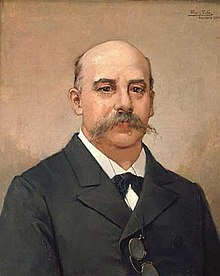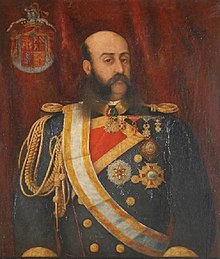Saint Daniel's Night
The night of April 10, 1865 is called Saint Daniel's Night or Night of the Slaughterhouse, in which the Civil Guard, Infantry and Cavalry units of the Spanish army, bloodily repressed the students of the Central University of Madrid who were performing a serenade in support of their rector Juan Manuel Montalbán in Puerta del Sol. Montalbán had been deposed three days earlier by order of the government of the Moderate Party of the General Narváez, as a result of not having dismissed Professor Emilio Castelar after his publication in the newspaper La Democracia of two articles very critical of Queen Isabel II, on February 21 and 22 1865. The Night of Saint Daniel is part of the first university issue in the history of Spain - the second took place in 1875 as a result of the application of the Orovio decree.
Background

On October 27, 1864, the Narváez Government had issued a circular in which it was expressly established the prohibition of professors in universities or outside of them issuing opinions by any means contrary to the Concordat of 1851 or defending, among others, the positions of Krausism.
The prominent leader of the Democratic Party and professor of History at the University of Madrid Emilio Castelar published an article titled Declaration on October 29 in the newspaper La Democracia, of the who was also the director, in which he criticized the circular of the Ministry of Public Works of October 27 - which, among other things, recalled what the Moyano Law of 1857 said that teaching should conform to Catholic orthodoxy - arguing that It was an attack on the freedom of research and teaching of Spanish scientists, that is, it was contrary to academic freedom.
In March 1865, several works with Krausist content that had been included in the Index of Prohibited Books the previous year were circulating through the Madrid university in the form of clandestine booklets. This situation gave rise to protests within the university by the so-called neo-Catholics, that is, the prominent members of the Moderate Party most intransigent to liberal doctrines.
At the same time, and given the serious economic crisis of an endemic nature that the public treasury was going through, the government decided to face it by selling some assets of the Royal Heritage, applying a part (75%) as income public, and the rest giving it to Queen Elizabeth II. This bill provoked the anger of the Democratic Party and the Progressive Party. On February 21, Emilio Castelar published an article in La Democracia entitled "Who owns the Royal Heritage?" and, the next day, another article titled "The Trait." In both, he was opposed to a part of the money from the disposal of the assets going to the private hands of the queen, considering that the Royal Patrimony was property of the nation.
The queen's decision to transfer 75% of the profits from the sale to the nation and thus address the State's deficit, and to keep 25% for herself, was presented in Parliament by the president of the government. and leader of the Moderate Party, General Narváez, as a gesture "so great, so extraordinary, so sublime" that was highly applauded by the majority of the deputies who described Isabel II as an "emule of Isabel the Catholic" and by the dynastic press that He was also full of praise. Emilio Castelar, on the contrary, believed that there was no such gesture -"the trait" as he ironically described it—because what the queen had actually done was appropriate 25% of a patrimony that belonged to "the country... The royal house returns to the country a property that belongs to the country." Thus the supposed "trait" It was actually a "deception, a disregard for the law, a threat..., and from all points of view, one of those tricks that the moderate party uses to maintain itself in power that the will of the nation curses." " Thus, Castelar's articles "came to discover the mystery [of the queen's supposed generosity]: Isabel, overwhelmed by debt, reserved 25 percent of the proceeds from the sale of assets that, in Most of them were not their heritage, but rather the nation's.
Censorship and repression
Although the article was censored, it was nevertheless distributed throughout Madrid in the form of pamphlets and leaflets. Despite everything, the controversy generated did not prevent the bill from being presented in the Congress of Deputies on March 3. The criticism intensified and, in application of the government circular of 1864, the Minister of Development, Antonio Alcalá Galiano, demanded from the rector of the Central University, Juan Manuel Montalbán, the immediate dismissal of Emilio Castelar, against whom on March 8 issued a prison order. Given the rector's refusal, the minister published in the Madrid Gazette the rector's dismissal on April 7, at the same time that Castelar was stripped of his History Chair.
The reaction of the Narváez government was, therefore, of great virulence, since it not only removed Emilio Castelar from his chair of History at the University of Madrid and dismissed the rector of the University, Juan Manuel Montalbán, for refusing to teach the file against his companion, but the Minister of the Interior Luis González Bravo declared a state of war in anticipation of incidents.
With the dismissal of Montalbán, the same day the neo-Catholic Diego Miguel y Bahamonde was appointed as the new rector. The measures provoked an immediate reaction of solidarity with Castelar and Montalbán on the part of the teaching staff and students, with professors Nicolás Salmerón and Miguel Morayta, among others, resigning from their positions. Previously, on April 4, through the newspaper La Iberia, it had been known that repressive measures were going to be taken and a "serenade" of student support for the dismissed Montalbán.
The Minister of the Interior, Luis González Bravo, far from temporizing and faced with the possibility that the announced serenade would be held, in addition to the proclamation of the state of war, issued a decree that allowed the Government to suspend constitutional rights, the internal deportation of unrelated people and press censorship. However, on the same day the 7th, the serenade had been authorized by the civil governor of Madrid, José Gutiérrez de la Vega, but it was immediately prohibited by González Bravo. By his order, the Civil Guard dissolved the attendees and closed the center of Madrid for the next two days.
Saint Daniel's Night

On Monday, April 10, the new Rector took office and swore fidelity to the queen. This sparked protests among students and mobilized the Progressive Party in the outer neighborhoods of the capital. In the afternoon, students, workers and representatives of the Democratic and Progressive Parties came to Puerta del Sol from different points with the intention of offering a new serenade. Upon arriving near Sol, Minister González Bravo ordered the Civil Guard to charge against the protesters. There was also an Infantry unit and another Cavalry unit in the area that had been mobilized in the morning for the occasion. In total about a thousand armed men.
When the civil guards on foot and on horseback arrived at Puerta del Sol, according to a witness, "without any summons or warning of any kind, they began with blind courage to use their weapons and hunt down the crowd." careless." Various charges were made, with shots and fixed bayonets. The protesters dispersed through the adjacent streets and tried to place barricades without success due to the action of the Cavalry. During the successive waves, fourteen people died and one hundred and ninety-three were injured to varying degrees.
The majority of the dead and injured were bystanders who were not participating in the student riot, including the elderly, women and children. On the other hand, the Civil Guard only had several minor injuries and one seriously injured, a sentry on horseback who received a stone in the head; Therefore, the Minister of the Interior Luis González Bravo exaggerated when he assured the Cortes that "the blood of our soldiers had been spilled." The tragic events were due, according to Josep Fontana, "to a fit of rage by Narváez and González Bravo, who considered themselves challenged by the protesters and incited the brutal attack."
Consequences
That same night in the Senate, González Bravo explained the measures taken against the protesters and the press was expelled from the session, issuing the immediate order to censor what the newspapers were to publish the next day. Several of them came out on those days with blank covers. On April 11, Narváez had called an extraordinary Council of Ministers in which Alcalá Galiano and González Bravo clashed over the harshness of the repression, with the former suffering angina and dying shortly after. At the same time, several newspapers such as Las Novedades, La Iberia, La Democracia, El Pueblo, La Soberanía Nacional and La Nación published a joint editorial in which they called for calm among liberals and progressives to avoid entering into the trap of government provocation. The same would happen on April 12, 14 and 19.
Political reactions occurred in the following days in the Senate, but were very attenuated due to the fear of being persecuted that all those who opposed the Narváez government had at that time. Salustiano Olózaga, Cánovas del Castillo and Antonio de los Ríos Rosas were the most critical of González Bravo, and he and Ríos Rosas challenged each other in a duel that ended without consequences.
The political consequences of the "St. Daniel's Night" They ended the Narváez government. Deputies of the Liberal Union, such as Cánovas del Castillo, Posada Herrera and Ríos Rosas, also directed their criticism towards González Bravo—Ríos Rosas shocked the Congress of Deputies when he stated: "that blood weighs on your heads."— This situation convinced the queen that she should dismiss Narváez, although she still waited two months until June 21, 1865, when she called O'Donnell again. Elizabeth II did not listen to her mother María Cristina, who advised her to call the progressives to integrate into the monarchy and stop conspiring against it, and this despite the fact that O'Donnell expressed to the queen his desire to retire from politics and go abroad.
People as ideologically diverse as Salmerón, Castelar, Cánovas and Olózaga shamelessly showed their rejection of government policy and, in one way or another, announced the end of the reign of Isabel II, against whom the students and people of Madrid They were already showing their anger.
Contenido relacionado
History of Logic
GM-NAA I/O
Hittite laws
Donation of Pepin
History of optics